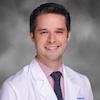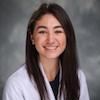Read some of our residents' answers to frequently asked program questions.

Bradley Ackerson, MD
Resident, Class of 2023
What one word would you use to describe the Duke Radiation Oncology program?
Passionate! I can say from my time here that our Department has a deep passion for always doing the right thing for our patients. We are passionate about furthering the field of radiation oncology through scholarly pursuit. We are passionate about educating the next generation of oncologists. And we are passionate about working together to achieve these goals!

Marie Fort, MD
Resident, Class of 2028
What attributes or skills would you use to describe an applicant that is a good “fit” for Duke?
Duke is a large, busy academic institution and our department is no exception. We see quite a few patients and I think that the clinical volume is one of the biggest strengths of our program as we see a lot of bread-and-butter cases but also have enough patients come through each rotation to see rare cases as well. I think that in order to thrive, applicants that are a good fit for our program would be self-driven, empathetic and curious individuals that are excited to learn about everything and to take ownership of the patients on each rotation. Dr. Brizel, the first attending I worked with here, always said “be the captain of your ship,” and that mentality is invaluable. Being both the educated clinician patients need and the empathetic physician that patients can rely on to get them through a tough treatment course and have full trust in is the foundation of our department.
How do residents interact with each other? Are people friendly?
I rotated as a medical student on an away rotation in the department and what immediately drew me to the residency was how friendly and welcoming all the residents were. They would frequently make plans to see each other outside of work and were quite social in and out of the resident room. Now having been a resident, I can say that the energy hasn’t changed a bit. Those of us on office days will chat in the room between contours and note prep and we will often eat lunch together, time allowing. Outside of work, we often get together; we recently used the free GME tickets and went to see the Durham Bulls play. We are a clinically excellent program for training, but I would argue building community in the resident room is just as important, and I cannot imagine a better group of people of culture to support and be supported by.
How are R1s supported in the transition into residency?
All residents start off with several days of orientation, both at our main site as well as the VA, which helps everyone get the lay of the land and ensure all of the logistics of EMR access are done early. We have a resident on resident session as well where we help set up Epic and Aria to optimize workflow and go through each step from documentation to treatment planning and review. New residents are protected from call the first month; once it is time for the first call week, we have a buddy call system so that no R1 feels unsupported or alone and has a dedicated senior they are able to call for questions as needed. We also have a tight-knit group in the resident room and are always answering questions for each other and happy to help cover or chip in when other residents need.

Kevin Goff, MD, PhD
Resident, Class of 2028
Can you explain the different clinical sites, and the patient population and amount of time spent at each?
Duke Cancer Center (Main Duke): Most of the core clinical rotations are based at the Duke Cancer Center, contiguous with Duke University Hospital. Day to day, residents are embedded in the full department workflow and regularly intersect with disease-site tumor boards and adjacent clinics (med onc, surg onc, rads, path, palliative care). The patient population is broad: Duke draws complex referrals from across the Southeast and beyond while also caring for a large local and often rural cohort that includes many Medicaid and uninsured patients. Volume is high (~160 patients on treatment daily), and case variety skews toward rare, advanced or otherwise nuanced presentations – ideal for repetition plus depth. We get excellent training with a particularly high volume of cases in sites such as CNS, GI, gyn/brachy and more.
Durham VA Hospital: Most residents spend 9-12 months or approximately one block per year at the VA across residency. The VA sits directly across the street from Duke University Hospital, and is in fact closer to our parking garage than our main site! The feel is purposefully different: residents run their own services and maintain their own patient panel with close attending oversight. That graduated autonomy – owning consults, sims, on-treatment decisions and follow-up – is consistently cited as one of the most formative experiences. As the only VA radiation oncology center in North Carolina, the clinic serves veterans from across the region, adding exposure to this distinct patient population.
There are additional opportunities at Duke affiliated sites such as Wake County (Raleigh) that are available but not required. Our program leadership is also incredibly supportive of residents who are motivated to pursue away rotations, although this is by no means necessary to meet our case requirements. Recent examples include global health, prostate brachy and pediatric/protons–based away rotations.
What is morning conference like?
Morning conferences generally run 8-9 a.m. daily and are both protected and practical. Conferences are currently hybrid, with most attending in person but a Zoom option remaining available for those who need it or who are at the VA.
Conference topics include annual disease-site curriculum, including staple lectures from our faculty and our colleagues in fields such as neurosurgery, medical oncology, radiology and nuclear medicine. Site-specific blocks also include treatment-planning sessions, mock orals and journal clubs.
Beyond disease sites: A narrative oncology series; personal finance for physicians; negotiation seminars; and the SUCCEED seminar, where recent grads and faculty debrief job searches and early-career moves.
Resident-selected outside speakers: Each year, residents invite two radiation oncologists from outside Duke for a lecture and small-group time.
Resident-driven content: Wellness sessions, research poster/talk practice, interesting cases, cup of Joe (the monthly meeting with the PD) and a monthly meeting with our chair.
How is resident research supported?
Mentorship is the engine. Our faculty span the spectrum – from basic science to investigator-initiated and multi-institutional clinical trials – and they mentor with both depth and reach. They share ideas, open doors and just as readily champion our own projects and passions. Duke is a big place, and the opportunity to collaborate across departments is nearly infinite.
The RORS pathway pairs the Holman Pathway during residency with a post-residency mentored instructorship, giving up to 45 months of protected (~80-100% effort) scholarly time. The extra time is explicitly designed to write and win K-awards and other career development grants while continuing under the same mentors. While there has been national uncertainty around the future of research funding and the structure of early academic careers, I feel incredibly supported within this pathway and have experienced nothing but transparency and promises-kept as I continue to work toward my goals.

Rachel Shenker, MD
Resident, Class of 2024
Can you describe an example of a "typical" day as a resident?
I always start my day with some coffee! This is ready to go by ~7:45 a.m. and then I drive ~5 minutes to the hospital from my house. I get to the resident room around 8 a.m. to listen to lecture (although many of my coresidents choose to listen in remotely!). 8-9 a.m. is protected lecture or study time (or wellness activities with treats). At 9 a.m., clinic starts and will run until around 4:30 or 5 p.m. On office days (1-2 per week depending on the rotation), I will work on contouring, treatment planning with attendings, reading key papers or working on research projects. I typically leave around 5:30 p.m. and then spend the evening going on a run with my dog, grabbing a drink with a friend, seeing a show at Durham Performing Arts Center or watching a Hurricanes hockey game at the PNC arena in Raleigh!